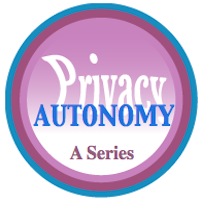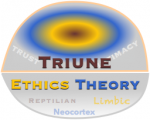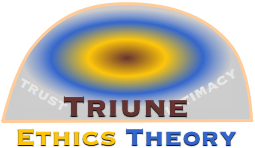 The coronavirus “pandemic” feels like some kind of turning point for humankind in terms of individual autonomy. I perceive that the response to the emergence of the virus is asymmetrical to its actual health threat, and this is leading people around the world to relinquish their individual rights on a scale I have never seen before. The coronavirus “pandemic” feels like some kind of turning point for humankind in terms of individual autonomy. I perceive that the response to the emergence of the virus is asymmetrical to its actual health threat, and this is leading people around the world to relinquish their individual rights on a scale I have never seen before.
This post discusses this event (a sign in semiotics) within the context of privacy and autonomy in the digital age. My discussion is not a conspiracy theory as I find those pointless and disempowering. I link various technology and social happenings and place their significance within the context of human nature. I also reference some neuroscience to help you understand the situation at a new level. I conclude with suggestions for action.
[…]

Trust and the Triune Ethics Theory reviews Darcia Narvaez’s breakthrough Triune Ethics Theory paper and draws new insights into how trust and relationship building work, based on the human brain’s evolutionary development, structure, and functions. And it sheds light on how experiential social media increases intimacy.
Triune Ethics Theory, Darcia Narvaez, Ph.D.
 Triune Ethics is an enthralling, exceedingly useful approach to understanding human behavior because it explains the context of trust and relationship building at a profound level that is actionable for anyone who wants deeper, richer, more flexible connections and collaboration with people. Triune Ethics Theory will help me to educate my clients and teams at a deep level, and it can give you a rare understanding of your own behavior—and that of people around you. Triune Ethics is an enthralling, exceedingly useful approach to understanding human behavior because it explains the context of trust and relationship building at a profound level that is actionable for anyone who wants deeper, richer, more flexible connections and collaboration with people. Triune Ethics Theory will help me to educate my clients and teams at a deep level, and it can give you a rare understanding of your own behavior—and that of people around you.
As with all my reviews, I will attempt to summarize this paper’s salient points before adding some reflections and conclusions about how I’m using its assertions in my work. As I have no formal training in neuroscience, I am drawing on lay study as well as psychology and my […]
 Unique, Insightful and Useful Guide to Business and Civil Politics reveals human political strategies through the eyes of a primatologist studying a chimpanzee community. It lays bare most of the behavior people use “to get ahead” in business and politics by explaining the evolutionary underpinnings of these behaviors, so we can appreciate them at a new level. Unique, Insightful and Useful Guide to Business and Civil Politics reveals human political strategies through the eyes of a primatologist studying a chimpanzee community. It lays bare most of the behavior people use “to get ahead” in business and politics by explaining the evolutionary underpinnings of these behaviors, so we can appreciate them at a new level.
Have you ever heard someone say, “I’m not political!”? S/He may mean well, but this book shows that one cannot be human without being “political”; moreover, it explains political behavior in hilarious, poignant ways that help the reader in multiple ways as I detail here. It is immensely entertaining to read while being scientific in its assertions.
[…]
 How to Protect Yourself from Pervasive Surveillance and Control shows how you can act to protect yourself, your family and your community from the rise of digitally enabled surveillance and control. How to Protect Yourself from Pervasive Surveillance and Control shows how you can act to protect yourself, your family and your community from the rise of digitally enabled surveillance and control.
Privacy and Autonomy in the Digital Age is a series I’m writing to share my insights into disruptive risks that we face, individually and collectively, due to the digitization of the world. As I wrote in Part1, my technology adoption crystal ball says that the convergence of pervasive digital data, smart devices and their centralized [cloud] control enables unprecedented surveillance and control of people at a very low cost. This post offers various suggestions for mitigating the risks, while Police State Scenarios (Part3) discusses ways that collective permanent loss of autonomy could unfold.
[…]
 Technologies Enabling the Police State describes the inevitability of pervasive surveillance, how it’s developing, and how we can act now to maintain the maximum degree of freedom. This is Part1 of a series on autonomy in the digital age. Personal and Collective Actions to Maintain Autonomy (Part2) is a how-to post, while Police State Scenarios (Part3) discusses ways that collective permanent loss of autonomy could unfold. Technologies Enabling the Police State describes the inevitability of pervasive surveillance, how it’s developing, and how we can act now to maintain the maximum degree of freedom. This is Part1 of a series on autonomy in the digital age. Personal and Collective Actions to Maintain Autonomy (Part2) is a how-to post, while Police State Scenarios (Part3) discusses ways that collective permanent loss of autonomy could unfold.
Despite their grim titles, these posts are not intended as doomsday writings, and I don’t intend to say that I think a police state is being developed intentionally. My conclusion is rather that the technologies of mass control are developing rapidly, and the risk is significant that some group will seize control of them in the foreseeable future. I think you’ll find some of their points surprising, perhaps even breakthrough. Please let me know in comments!
I did not want to write this post, and I doubt that you want to read it; however, as I explain here, we’re at a pivotal point of human history. We are rapidly losing our […]
|
|
 The coronavirus “pandemic” feels like some kind of turning point for humankind in terms of individual autonomy. I perceive that the response to the emergence of the virus is asymmetrical to its actual health threat, and this is leading people around the world to relinquish their individual rights on a scale I have never seen before.
The coronavirus “pandemic” feels like some kind of turning point for humankind in terms of individual autonomy. I perceive that the response to the emergence of the virus is asymmetrical to its actual health threat, and this is leading people around the world to relinquish their individual rights on a scale I have never seen before.

 Triune Ethics is an enthralling, exceedingly useful approach to understanding human behavior because it explains the context of trust and relationship building at a profound level that is actionable for anyone who wants deeper, richer, more flexible connections and collaboration with people. Triune Ethics Theory will help me to educate my clients and teams at a deep level, and it can give you a rare understanding of your own behavior—and that of people around you.
Triune Ethics is an enthralling, exceedingly useful approach to understanding human behavior because it explains the context of trust and relationship building at a profound level that is actionable for anyone who wants deeper, richer, more flexible connections and collaboration with people. Triune Ethics Theory will help me to educate my clients and teams at a deep level, and it can give you a rare understanding of your own behavior—and that of people around you. Unique, Insightful and Useful Guide to Business and Civil Politics reveals human political strategies through the eyes of a primatologist studying a chimpanzee community. It lays bare most of the behavior people use “to get ahead” in business and politics by explaining the evolutionary underpinnings of these behaviors, so we can appreciate them at a new level.
Unique, Insightful and Useful Guide to Business and Civil Politics reveals human political strategies through the eyes of a primatologist studying a chimpanzee community. It lays bare most of the behavior people use “to get ahead” in business and politics by explaining the evolutionary underpinnings of these behaviors, so we can appreciate them at a new level. How to Protect Yourself from Pervasive Surveillance and Control shows how you can act to protect yourself, your family and your community from the rise of digitally enabled surveillance and control.
How to Protect Yourself from Pervasive Surveillance and Control shows how you can act to protect yourself, your family and your community from the rise of digitally enabled surveillance and control.